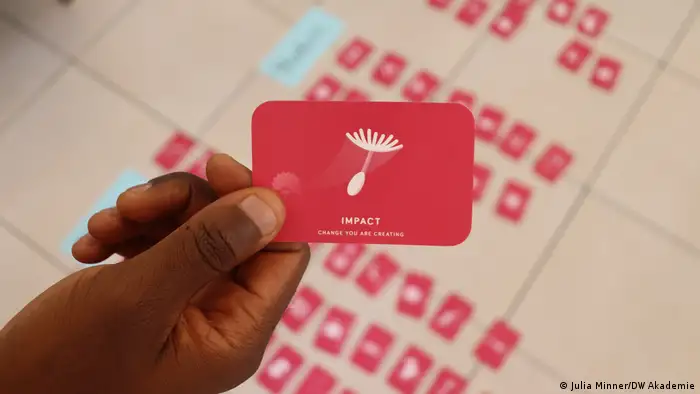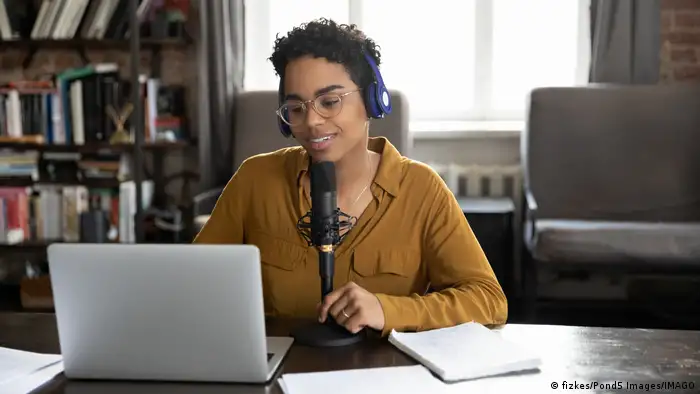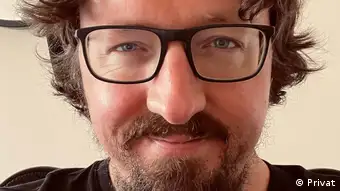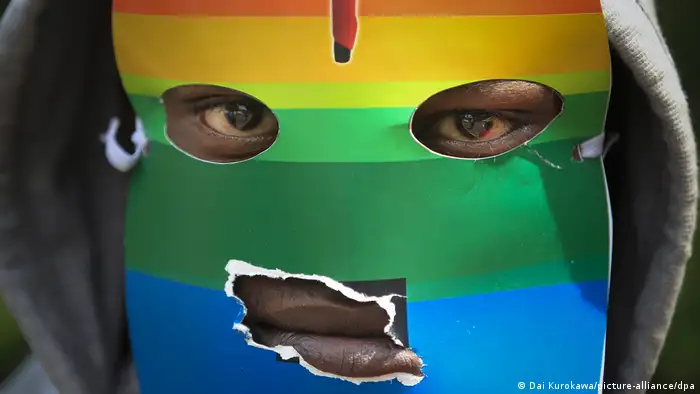Home
"Podcasting is democratic"
There's no one size fits all solution in journalism, but podcasting has kind of revolutionized the way journalistic content is produced, distributed and consumed. Award-winning podcaster Paul McNally shares his insights.
DW Akademie: What are the benefits of podcasting compared to radio?
Paul McNally: Radio gives huge opportunities for people, especially community stations on a local level. But on the other hand, they also gate-keep people from getting into, and thus not being able to, express themselves. Podcasting has really made that a more democratic process.
Radio stations are very male-driven, for example. I've yet to meet a station manager in South Africa, at least in a community station, who's a woman. To change that structurally is more challenging than just creating a medium where people can do podcasting on their own in their own bedroom and find an audience and a distribution model on their own steam.
What are the main challenges of podcasting?
I think there is a good play still in terms of producing compelling podcasts that find an enthusiastic audience, but then partnering with radio stations to air that content to get it into very rural areas, I still think there are barriers around that.
On the content side, we're very liberated and people can make podcasts all the time. The challenge is on the other side, on the consumption side, because data is still very expensive and therefore inaccessible to a lot of people. We need to do more to make podcasts more accessible, to make it easier for people to get hold of the content.
And what are your solutions?
Podcasting still skews toward young people and then podcasts on YouTube, for example, skew toward even younger audiences. YouTube is still an app that's on most people's phones when they buy it and that makes it very accessible, especially in terms of getting that content to vulnerable people.
We (at Develop Media, editorial note) have had some success with podcasts that have been distributed over WhatsApp as voice notes, too. WhatsApp is king in a lot of African countries and people are very, very excited about being able to get their content through the platform. Obviously, there are limitations of length and complexity because it compresses the audio. Unfortunately, you can't really tell if people have listened to it. But on the flip side, they could be sharing it hundreds of times to all their contacts and you wouldn't know that, either, which is kind of a benefit that you never see. And there is something interesting in terms of people being able to instantly feedback to you. If they like a podcast, they can just text you back and say ‘I really like that’. In some African countries, you can buy WhatsApp bundles which you pay for once and in the whole of the month, the data is free. So, everything that people consume through WhatsApp is then already paid for. That creates a huge benefit for a content creator: people don't feel that they're being charged.
What are the topics you are dealing with?
I don't like to box things in like ‘these have to be the topics’. We (at Develop Media, editorial note) have done a few series that are investigative in terms of corruption and assassinations because that's rife in a place like South Africa. It's a huge growing problem. We also have been working on a series about LGBTQ+ rights in Nigeria, which is a very challenging topic.
Other work has been around journalism in South Sudan. We're really interested in the safety of journalists in Africa and I think shining a light on that is very difficult because the journalists that you would want to be reporting on often can't speak and they fear for their lives sometimes.
But I think that with the right tools and the right scripting and narrative, you can turn any investigation into a podcast series.
What about long format podcasting – what’s the secret of their success?
You don't want to waste people's time. I think that's the key thing. We live in an age where some podcasts are like three hours long – some of them are very successful – and I think that created an atmosphere where people feel they don't have to edit. And that's kind of fascinating when we also live in an age where people have incredibly short attention spans and others are saying everything has to be 15 seconds. But on the other hand, with audio, people can wash up, they can go for a run and they can drive, they can do something else like that, but they can't do anything else media-related while they're listening. They can't second screen really, and I think that is something that you're competing with. So, you need to be aware of that.
As a journalist, can you make a living out of podcasting?
When you look at the monetization, it's really about community-building. Most small media houses are going in that direction and that's really where they're finding their success.
So if you're able to find your audience and to communicate with them directly, if they feel that they're part of something and if they feel they can contribute, then they're more likely to pay you. Community-building can come from a newsletter list obviously, but in places like Africa, maybe a WhatsApp group. And once you start distributing your content in that way, then you're maybe a few skips and a jump away from going like ‘would you like to pay a couple of dollars for this?’ and if you can grow your audience in that way, I do think there's a revenue stream in that.
In terms of making a living out of it, I mean that's a lot of a couple of dollars. It’s not something that just affects podcasting, it’s also affecting everyone in media. The truth is that these kind of long-form investigations take so much time – even before you start editing your podcast. That costs a fortune. If you're able to produce your investigation in a format like a long-form article that maybe you are already working on and the podcast is a separate thing, that's kind of where we're encouraging people to go to.
But what's interesting about podcasting is that there's been a couple of very big names making a lot of money.

DW Akademie's MethodKit for Podcasts was developed in cooperation with podcast experts to support the process of developing and producing podcasts
What are your most important ‘Dos’ in podcasting?
You shouldn't stop. Especially if you're doing something for the first time, you should keep it going. There are so many podcast streams that only have one episode. It's a good idea to know if you're doing something weekly or like a current affair show, and don’t be disappointed that you didn't get many listeners or that it doesn't sound as good as you wanted it to be. But especially when we're talking about long-form investigative podcasts, I would recommend that you check the sound quality.
You can have a good story and you can tell it very badly and then people will turn it off after five minutes. You should use cliffhangers and twists which can be very small actually, but you can make a big deal of them sometimes, and that's also that kind of ability to move between something being very important to not so important – this is what journalists have always done. You're always playing with that emotional strand. That is very important. Therefore, the listener will believe you and will go with you, but you need to have confidence and conviction with that. So that's how you keep people listening.
Last, but not least: A lot of people that want to do an investigative podcast, they actually haven't really listened too much to that format – but you need to listen to all those podcasts out there.
South-African journalist and media entrepreneur Paul McNally is the founder of ‘Develop Audio,’ an organization that nurtures a network for podcasters in Africa and creates investigative podcasts of the highest quality – with a focus on social justice, human rights and corruption reporting. With DW Akademie, McNally helped create ‘The Podcast Knowledge Guide’, an introduction to making podcasts, offering tips and tricks, answering burning questions and highlighting common mistakes. It is based on DW Akademie’s ‘MethodKit for Podcasts’. He is also the founder of ‘Develop AI,’ an organization that reports on Artificial Intelligence (AI) in Africa and trains journalists to use it responsibly.
DW recommends
- Date 14.11.2023
- Feedback: Send us your feedback.
- Print Print this page
- Permalink https://p.dw.com/p/4YkuI
- Date 14.11.2023
- Send us your feedback.
- Print Print this page
- Permalink https://p.dw.com/p/4YkuI



